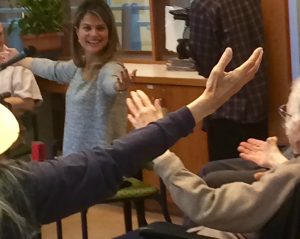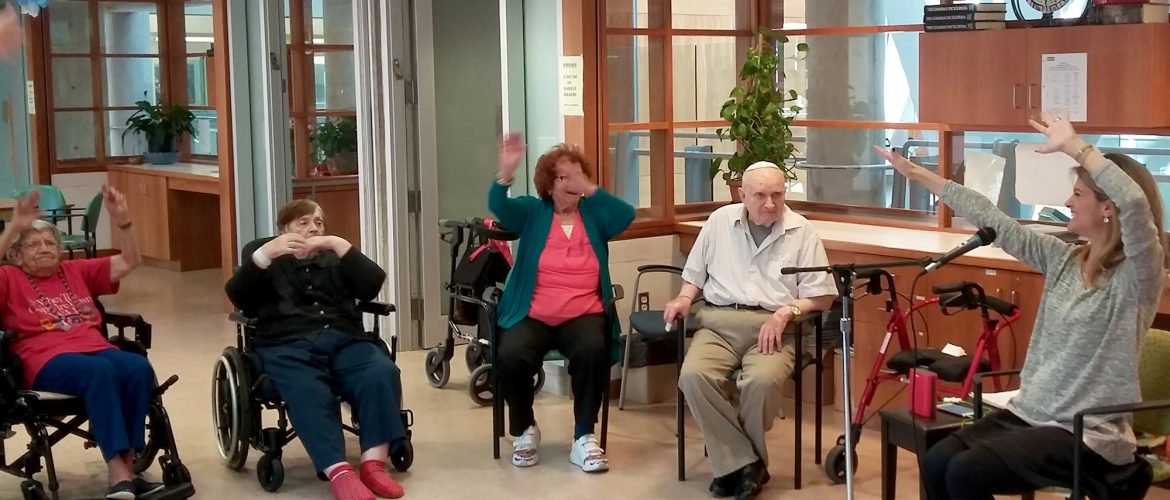Dance has the ability to move people literally and figuratively. It’s no different with seniors experiencing dementia.
“Dementia, is a progressive disease where language and communication over time starts to decline,” explains Melissa Tafler, coordinator for the arts and health program at Baycrest Health Sciences. “Dance offers a different way of communicating: it bypasses cognitive skills; it bypasses verbal communication. It allows people who have dementia and people who don’t have dementia to have a shared experience together. It’s an inherently social experience.”

Dance instructor Annie Raphael interacts with seniors during filming of the e-module.
Baycrest has been running a specialized dance program for long-term care residents with dementia since 2012. “We began to talk to Canada’s National Ballet School about the development of a standardized dance curriculum, that we could evaluate and say with confidence that it was effective in a long-term care setting.”
A team from the Ballet school joined forces with Tafler to create the curriculum that has been refined throughout the last five years. It’s considered the first of its kind in Canada. Now, Tafler and her team hope to share their successful project outside of Baycrest’s walls. “All over the world,” she adds. “We’re going big.”
CABHI’s role
Tafler applied for the Knowledge Mobilization Partnership program (KMP2) at the Baycrest-led Centre for Aging + Brain Health Innovation (CABHI). The aim of the program is to drive adoption of best and next practices in the aging and brain health sector. It’s meant for projects that have already been successfully validated within their settings and are ready for wider use.
“We are really excited that the KMP2 program is helping us take the curriculum that we’ve developed and translate it into an online learning module,” says Tafler. “In terms of dissemination and spread, this will allow people who are outside of Toronto – outside of Canada – to be able to access the curriculum.”
Kataryna Nemethy, Baycrest’s e-learning developer & instructional designer, says the e-learning modules are an opportunity to educate dancers from around the world who might not have worked with people living with dementia. “We want them to know about aging with dementia, but also the other side of that. It’s not about pathology; there is still life and meaning and purpose. We’re trying to capture that.”
Filming for the online tool began earlier this year. Cameras have captured residents painting, creating pottery work and of course, participating in the unique dance sessions.
Annie Raphael, a Toronto-based dance instructor, is participating in the filming of the e-modules. She trained for eight months under the guidance of Baycrest and Canada’s National Ballet School before she started delivering classes to seniors with dementia. From experiencing the effects of aging with a simulation suit to learning about appropriate tone of voice and colours to wear, Annie says she gained a lot of valuable information.
“We’re at the forefront of making this a routine experience for long-term care facility residents. And I am really happy to be a part of it,” Annie says, adding that she’s constantly in awe of the participants’ talent and engagement levels.
Kataryna adds: “It’s really moving. It’s quite a powerful program.”
The e-learning module will be beta tested and disseminated by September 2018. Stay tuned for more updates and in the meantime, check out this CBC news video to see the impact the program is having on the lives of long-term care residents:


